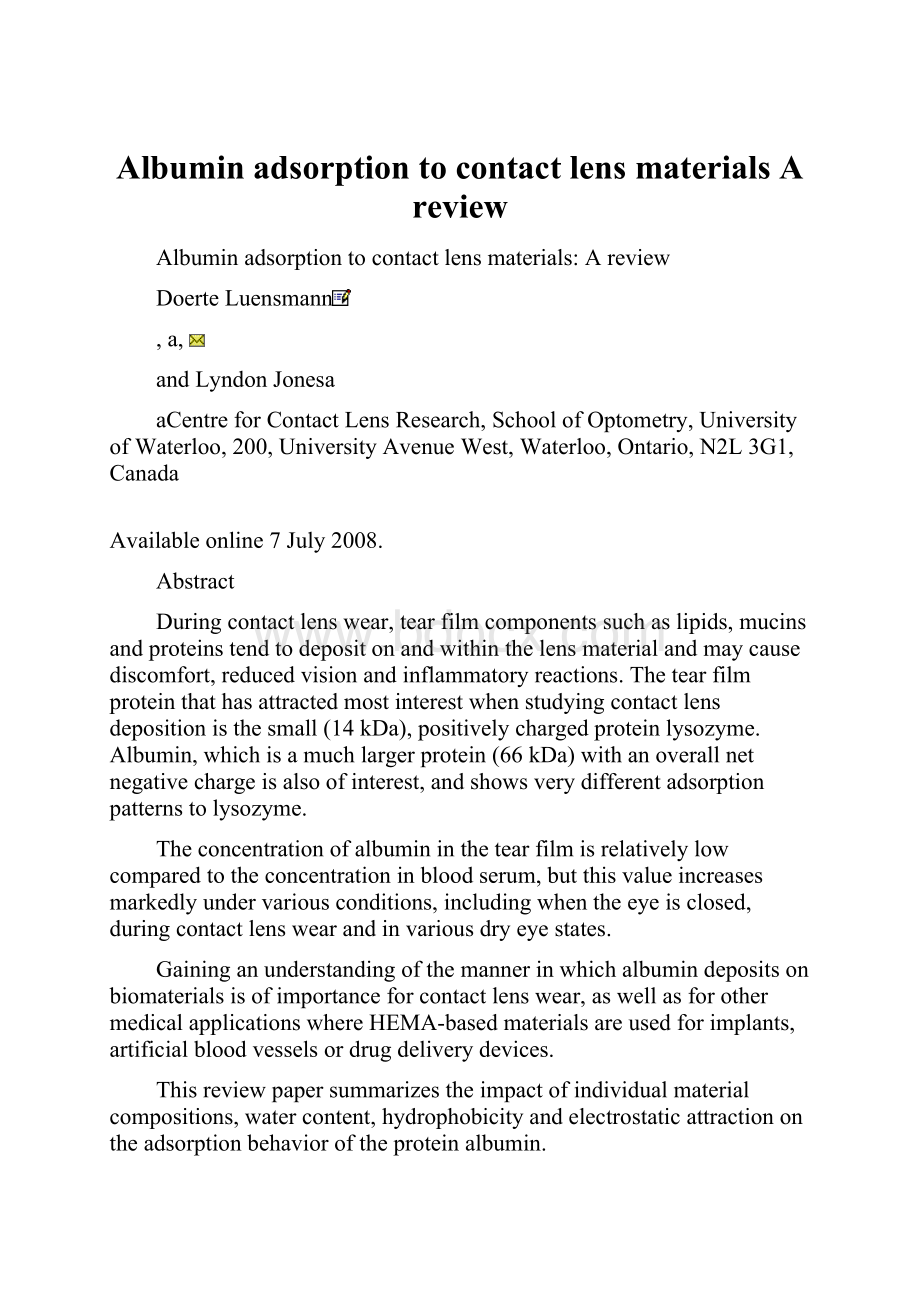Albumin adsorption to contact lens materials A review.docx
《Albumin adsorption to contact lens materials A review.docx》由会员分享,可在线阅读,更多相关《Albumin adsorption to contact lens materials A review.docx(29页珍藏版)》请在冰豆网上搜索。

AlbuminadsorptiontocontactlensmaterialsAreview
Albuminadsorptiontocontactlensmaterials:
Areview
DoerteLuensmann
a,
andLyndonJonesa
aCentreforContactLensResearch,SchoolofOptometry,UniversityofWaterloo,200,UniversityAvenueWest,Waterloo,Ontario,N2L3G1,Canada
Availableonline7July2008.
Abstract
Duringcontactlenswear,tearfilmcomponentssuchaslipids,mucinsandproteinstendtodepositonandwithinthelensmaterialandmaycausediscomfort,reducedvisionandinflammatoryreactions.Thetearfilmproteinthathasattractedmostinterestwhenstudyingcontactlensdepositionisthesmall(14 kDa),positivelychargedproteinlysozyme.Albumin,whichisamuchlargerprotein(66 kDa)withanoverallnetnegativechargeisalsoofinterest,andshowsverydifferentadsorptionpatternstolysozyme.
Theconcentrationofalbumininthetearfilmisrelativelylowcomparedtotheconcentrationinbloodserum,butthisvalueincreasesmarkedlyundervariousconditions,includingwhentheeyeisclosed,duringcontactlenswearandinvariousdryeyestates.
Gaininganunderstandingofthemannerinwhichalbumindepositsonbiomaterialsisofimportanceforcontactlenswear,aswellasforothermedicalapplicationswhereHEMA-basedmaterialsareusedforimplants,artificialbloodvesselsordrugdeliverydevices.
Thisreviewpapersummarizestheimpactofindividualmaterialcompositions,watercontent,hydrophobicityandelectrostaticattractionontheadsorptionbehavioroftheproteinalbumin.
Keywords:
Serumalbumin;Contactlensmaterials;Proteindeposition
ArticleOutline
1.Albumininthepreoculartearfilm
2.Albuminadhesiontovarioussubstrates
3.Albuminadsorptionatbiomaterialinterfaces
4.Albuminadsorptiononcontactlensmaterials
5.Watercontent
6.Hydrophobicity
7.Charge
8.Poresizeandsurfaceroughness
9.Temperatureandionicstrength
10.Conclusion
References
Contactlensdepositionwithsubstancesfromthehumantearfilmhasbeenextensivelystudied[1],[2],[3],[4],[5],[6],[7],[8],[9],[10],[11],[12],[13],[14],[15],[16],[17],[18],[19],[20],[21],[22],[23],[24],[25],[26],[27],[28],[29]and[30].Themajorityofpublishedstudieshavereportedontheinvivoorinvitrodepositionofeither“totalprotein”[23],[31]and[32]or,morespecifically,lysozyme[11],[33]and[34].However,lysozymeonlyaccountsforaproportionoftheproteinsinthetears,withothermajortearfilmproteinssuchaslactoferrin,albuminandlipocalinbeingalsopresentinhighquantities[35],[36],[37],[38],[39],[40],[41],[42]and[43].To-date,littlehasbeenpublishedontheinteractionbetweencontactlensesandalbuminandthepurposeofthisreviewarticleistodescribethefactorsthatinfluencethedegreetowhichthisproteininteractswithvariousmaterialsusedforcontactlenses.
Albuminissynthesizedintheliverandhasanestimatedlifetimeof27days[44]and[45].Itisthemostabundantproteininhumanserumandisalsothemostprominentsolubleproteininthebodyofallvertebrates[44].Hippocrates(circa460–370BC)wasprobablythefirstscientisttomentionsomedistinctivepropertiesofalbumininthehumanbody.SerumalbuminkeepstheosmoticbloodpressureandbloodpHvalueconstantandtransportsvariousmolecules,includinghormones,fattyacidsanddrugs[46].Inahumanbodyweighing70 kg,41%ofthetotalextravascularalbuminisfoundintheskin(100 g)and40%inthemuscles(96 g),withsmallamountsbeingdetectedintheliver,gutandsubcutaneousregion[47].Intheserum(intravascular),anaveragealbuminconcentrationof45.1–49.9 ± 2.6 mg/mlhasbeenreported[46],whichapproximatesto118 gforatypical70 kgbodyweight[44].
Overthelast60yearsinformationconcerningthestructureofhumanserumalbumin(HSA)hascontinuallybeenupdatedandrefined.In1956TanfordandBuzzell[45]andLoebandScheraga[48]describedthehydratedproteinasacompactspheroidparticle,whereas12yearslaterSquireetal.[49]reportedacigar-shapedmodelof140 Å × 40 Å.Thiswastheacceptedtextbookmodeluntil1990,whenCarterandHepresentedthefirsthigh-resolutioncrystallographicdataforHSA[50].Usingthismethodataresolutionof4 Åtheyfoundathree-dimensionalheart-shapedstructureforHSAinacrystallizedformat,whichwasconfirmed10yearslaterforbovineserumalbumin(BSA)inahydratedstate[51](Fig.1).
Fig.1. Overalldimensionoftheheart-shapedstructureforalbumin,asdescribedbyCarterandHe[50].
Full-sizeimage(43K)
Fig.1. Overalldimensionoftheheart-shapedstructureforalbumin,asdescribedbyCarterandHe[50].
ViewWithinArticle
Theshapeandphysicochemicalpropertiesofalbuminfromhumanandbovineserumareverysimilar(Table1).Thesecondarystructureofalbuminconsistsofthreeverysimilardomains(I,II,III)arrangedinnineloopswith17disulfidebridgestostabilizethenativeform.Eachdomainhastwosubdomains(AandB),withsubdomainAbeingcomposedofsixα-helixchainsandsubdomainBoffourα-helixchains.Thehelicesrangeinsizefrom5to31aminoacidsinlength[44],[52]and[53].DuetothesimilarityofHSAandBSA,andtherelativeavailabilityandlowercostofBSA,manyinvitrostudieshaveusedBSAasasurrogateforHSA[54],[55]and[56].
Table1.
ComparisoninstructurebetweenHSAandBSA[44]
Molecularweight(Da)
Isoionicpoint
Numberoffattyacids
Human(HSA)
66,438
5.16
585
Bovine(BSA)
66,411
5.15
583
Full-sizetable
ViewWithinArticle
1.Albumininthepreoculartearfilm
Farmorethan100differentproteinshavebeenidentifiedinthehumantearfilm[40]and[57].Specifictearproteinssuchaslysozyme,lactoferrinandlipocalinaresynthesizedbythelacrimalgland;howeveralbuminisaserumproteinandbecomesmixedwiththetearfilmbyleakagefromtheconjunctivalcapillaries.TheconcentrationofHSAinthetearfilmhasbeeninvestigatedbyanumberofresearchers,usingavarietyofdifferentanalyticaltechniques.In1993,BrightandTighereviewedninetearfilmstudiesandfoundavastrangeofpublishedconcentrations,between0.0103 mg/mland390 mg/ml[58].
Tearsmaybecollectedusing“stimulatedmethods”,suchasthoseinvolvingan“eye-flushing”techniqueorbystimulatinga“sneeze”,ascomparedwithan“unstimulatedmethod”,wheretearsarecollectedviaacapillarytubewhichdoesnottouchtheocularsurface[59],[60],[61]and[62].Generally,higherHSAconcentrationsarefoundduringsleep[37],[38]and[41],inunstimulatedtears[37],[59]and[61]andinpatientswithsymptomsofdryeye[63],[66]and[67]orwhenwearingcontactlenses[38]and[64].Table2summarizestypicalreportedalbuminlevelsinthepreoculartearfilmundervariousconditions.
Table2.
Albuminconcentrationinthetearfilm(mg/ml)
Nonstimulatedtears
0.042 ± 0.012[59]
0.023 ± 0.015[61]
0.06 ± 0.02[37]
Stimulatedtears
0.012 ± 0.004[59]
0.008 ± 0.001[65]
0.02 ± 0.01[37]
Duringsleep
0.20(0.15–0.58)[38]
1.1 ± 0.76[37]
1.0 ± 0.5[41]
Dryeyes
Increase17%[66]
3.7(0.2–22.6)[63]
4.74 ± 0.72[67]
Wearingcontactlenses
0.059 ± 0.054[64](healthyeye)
0.079 ± 0.060[64](presenceofbacteriaonCL)
0.54(0.33–1.24)[38](wearingOrtho-KCLovernight)
Full-sizetable
ViewWithinArticle
Lundhandcoworkersfitted50eyeswithcontactlensesandinvestigatedIgGandHSAconcentrationsinthetearfilm.Theconcentrationofbothserumproteinsincreasedin20eyes,indicatingahigherpermeabilityoftheblood–tearbarrier[68].TheimpactofetafilconAlenseswornonanextendedwearscheduleonproteinlevelsinthetearfilmwasinvestigatedbyCarnyetal.[69].Lactoferrin,lysozymeandHSAlevelsincollectedtearsweremeasuredon10neophytesbeforelenswearingandafteraperiodof6months.TherewasatrendforincreasingHSAconcentrationinthetearfilmoverthe6monthsofextendedwear,butthisincreasewasnotstatisticallysignificant.Inanorthokeratologystudy,Choyetal.[38]foundincreasingamountsofHSA,whileothertearfilmproteins(lysozyme,lactoferrinandlipocalin)remainedinanunchangedconcentration.TheratiobetweenHSAandlactoferrinhasalsobeenreportedasanindicatorfordiagnosingprimarySjogren'sSyndrome(SS)[70].Bjerrummeasuredtheproteinconcentrationinpatientswithconnectivetissuediseases,SSandcontrolsandconcludedthatanalbumin:
lactoferrinratioabove2:
1iscommonlyfoundinpatientsdiagnosedwithSS.Thesefindingsareofpotentialsignificance,sincehigherproteinconcentrationsinthetearfilmalsoappeartoleadtoincreaseddepositionlevelsoncontactlenses[15],[71],[72]and[73].
2.Albuminadhesiontovarioussubstrates
Theprocessofproteinadsorptionfromanaqueoussolutionontoasolidsurfaceistypicallydescribedinthreesteps.Firstly,transportationoftheproteinfromthesolutiontowardsthesolidsurfaceoccurs.Thisisfollowedbyattachmentoftheproteintothesurface,andfinallytheproteinstructureundergoesaconformationalchangeafteradsorption[74].CarterandHoinvestigatedthephysicochemicalpropertiesofHSAanddescribeditasaflexibleproteinthateasilychangesitsmolecularstructure[75].FluorescentX-raytechniquesrevealedthattheBSAmoleculesflattenedwhenboundonagoldsubstrateandtheheart-shapedprotein,withaninitialsidelengthof3 × 80 Å,increasedtoasidelengthof127 Å,withasimultaneousreductionindepthfrom30 Åto11.6 Å,withthisshortaxisbeingperpendiculartothesolidsurface[44]and[76].TheamountofHSAthatformsamonomolecularlayeronmostsurface